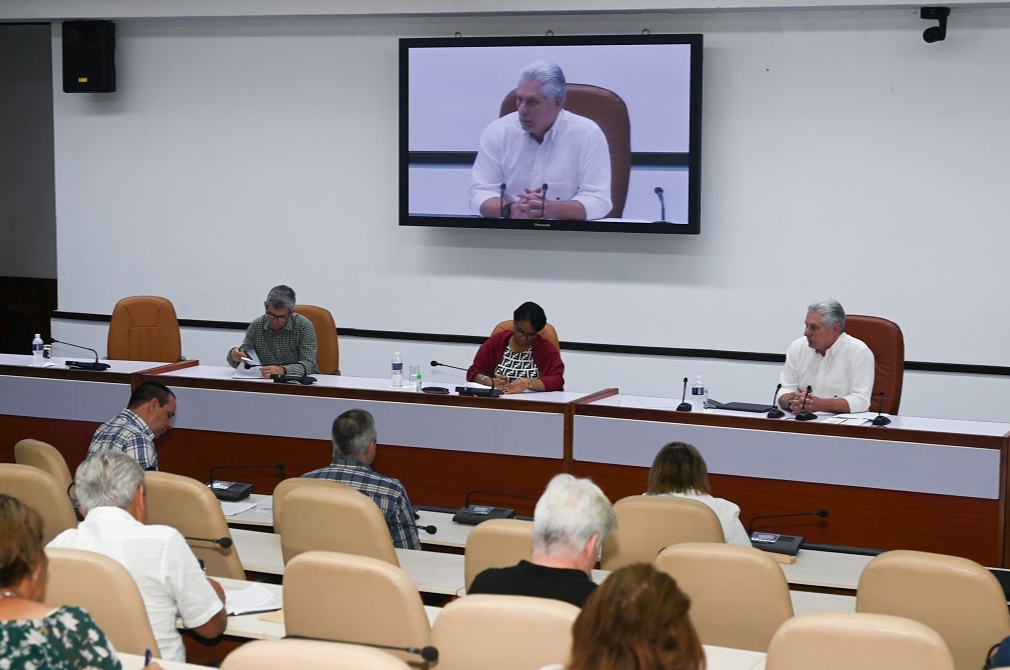The weekly meeting of the country’s top leadership with scientists and experts linked to health addressed the response that science and technology seeking to address population aging, an issue that the First Secretary of the Central Committee of the Party and President of the Republic, Miguel Díaz-Canel Bermúdez, described as present and future.
This Tuesday, from the Palace of the Revolution, the scientific community statistically argued one of the most challenging characteristics of Cuba’s demographic dynamics.
Antonio Aja Díaz, director of the Center for Demographic Studies at the University of Havana, pointed out that while in 2021 the aging population was 21.6 percent, in 2022 it is already 21.9, according to data from the National Office of Statistics and Information (ONEI).
But aging is not only a challenge for Cuba, Dr. Liliam Rodríguez Riveras, in presenting the paper, explained that the World Health Assembly and the UN declared the period 2021-2030 as “the decade of healthy aging”, an initiative in which Cuba is inserted with communities working to be friendly with older adults, to enhance their capabilities, in addition to ensuring the primary health care, as well as training of caregivers.
At the meeting, a geriatric evaluation kit was shared, developed by specialists of the COMBIOMED Digital Medical Technology Company. It is a briefcase with various equipment and tools that allows the diagnosis and monitoring of the most common pathologies in the elderly, explained the engineer and Master in Cinecias Arlem Lesmes Fernández Sigler.
The Combiomed Kit for geriatrics and gerontology evaluation includes a stethoscope, an automatic sphygmomanometer (Hipermax BF), a sumaSensor glucometer (for blood glucose monitoring); a system for the comprehensive clinical management of cognitive deficits in the elderly (NeuroGer), a pulse oximeter (Oxy FT), a device for the prevention and treatment of ulcers (Stimul W), a digital clinical thermometer, a hammer for measuring neurological reflexes, and a flashlight for medical use.
The introduction of these technologies for healthy aging into the healthcare system will be in a staggered manner.
The kit will be destined in its first stage to:
-30 psycho-pedagogical medical centers (social institutions of the SNS in charge of the comprehensive care of people with severe and profound intellectual disabilities).
158 homes for the elderly (social institution for long-term cohabitation for older adults who for medical and/or social reasons, cannot maintain an autonomous life and cannot be cared for in their situation of dependence by other forms of non-institutional care.
It is also intended to reach, in due course, to:
-The 450 multidisciplinary gerontological care teams that exist in the country’s polyclinics for the care of older adults with health conditions and/or social determinants (frail elderly) under specialized multidisciplinary and outpatient care.
-And to 11,548 family medical offices, which provide coverage to one hundred percent of the population with preventive actions for healthy aging in the course of life.
This contribution of the Cuban biomedical industry will help to achieve early diagnoses of the disease and thus modify lifestyles and intervene with treatments.
After the meeting, which was attended by Deputy Prime Ministers Inés María Chapman and Jorge Luis Perdomo, President Díaz-Canel called for working tirelessly to advance these projects, because this is a problem already faced by many Cuban families.


